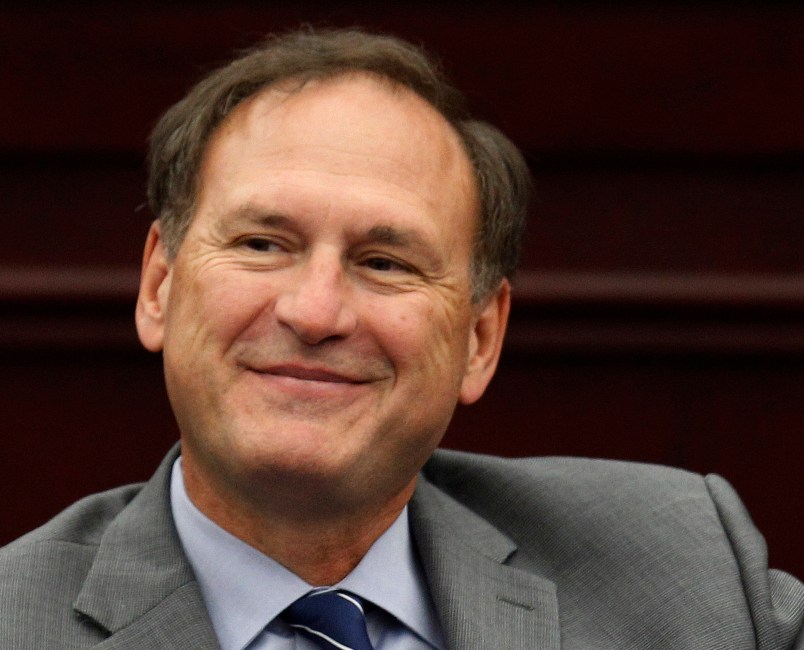The Supreme Court is expected to rule on Monday, the last day of its term, in a landmark case that unions fear could deal a fatal blow to their movement.
The case, Harris v. Quinn, is about the constitutionality of “agency fees” charged by public sector unions to all workers in a unionized setting, even non-union members. These fees are essential to their operation.
The particulars of the case concern Medicaid-based home health care workers in Illinois. The battle dates back to a 2003 executive order by Gov. Rod Blagojevich (D) which paved the way for the Service Employees International Union to become the exclusive agent representing state home health workers. Then in 2009, Gov. Pat Quinn (D) issued another executive order classifying home care providers as state workers, and therefore eligible for exclusive union representation. In 2010, a group of home health workers, led by Pamela Harris, brought a class action lawsuit alleging that the collective bargaining agreement that required non-members to pay union fees violated their First Amendment rights.
Unions fear the implications extend far beyond the home health worker profession in Illinois. Agency fees in principle are important to public employee unions because they’re required by law to bargain for all workers in a unionized setting. If agency fees for non-members are ruled to be a violation of free speech, unions fear they would lose funding, become less effective at bargaining for benefits and, in turn, lose members.
A death spiral.
One labor official said such a result would bring about “the possible final destruction of the American labor movement.” The official added, “It would cause the death not only of public sector unions and what’s left of private sector unions, but also the Democratic Party,” suggesting that the demise of unions would make Democrats more reliant on Wall Street money.
Joel Rogers, a law professor at the University of Wisconsin, wrote in The Nation magazine that the challengers’ case in Harris goes for the “kill shot” against public employee unions.
Indeed, conservative and libertarian legal advocates see a golden opportunity for a victory against public sector unions. The Cato Institute, a libertarian think tank, wrote in a friend-of-the-court brief arguing, “There can be no question but that Illinois’s scheme to compel personal assistants’ association with, and subsidization of, labor unions flunks traditional First Amendment scrutiny.”
The makeup of the Supreme Court, which breathed life into this challenge in the 2012 case SEIU v. Knox, gives unions enough reason to worry. But a new twist on Thursday gave them even more reason to be concerned. Two major opinions on presidential recess appointments and abortion-buffer zones were written by Justice Stephen Breyer and Chief Justice John Roberts, respectively. That raises the odds that Justice Samuel Alito, who has a strong anti-union bent, will write the opinion in Harris, given that the justices tend to divide up opinions.
“Based upon who has written this term for each month, those of us who look at those statistics believe Alito could well have the opinion (although sometimes what happens is that someone is assigned a majority opinion and loses the majority on the way),” Rick Hasen, a law professor at UC-Irvine, said in an email. “Alito has shown himself very anti union in his remarks and earlier writings, especially when it comes to public sector unions and mandatory dues. This seems to be the thing he’s passionate about the way Chief Justice Roberts is about race issues.”
“Harris could be the sleeper case of the year,” Hasen said.







When unions first organized, there was much shedding of blood. Just sayin’.
Once people finally lose patience with their wages and benefits being taken away and the wealthy getting fatter and fatter, once people used to a basic but comfortable lifestyle see that destroyed and the prospects for their children on the decline, it’s really not gonna matter what the fascists on the Supreme Court think, or what the liars on Fox News say.
Fact is, America just isn’t hurting enough to resist this bullshit. Yet.
Another bitterly ironic consequence of Ralph Nader’s 2000 campaign. Because of his gigantic ego, the man who has spent his entire adult life complaining about the influence that corporations and business have on American life managed to vastly increase that influence beyond the worst nightmares of all those so-called “progressives” who whined about how Al Gore was a “corporatist.”
Unintended consequences are a bitch.
It took decades to get the court in a conservative mode and now they right is taking advantage of what they have put in place. They will use the court to dismantle as much of what we call America as possible. WEALTH RULES!
That’s what Marie Antoinette thought as well.
I read a lot of history of the labor movement, and it was one of great struggle, violence, and perseverance. The wealthy owners absolutely did not want their workers to unionize and they were willing to use every ounce of power they had, including government influence and the media, to make sure it didn’t.
It’s amazing to me to see that, less than 100 years later, it’s all slowly being eroded away.